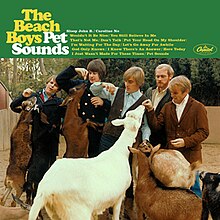Pet Sounds (album)
| Pet Sounds | ||||
|---|---|---|---|---|
 |
||||
| Studio album by the Beach Boys | ||||
| Released | May 16, 1966 | |||
| Recorded | July 12, 1965 – April 13, 1966 | |||
| Studio | United Western Recorders, Gold Star Studios, CBS Columbia Square, and Sunset Sound Recorders, Hollywood | |||
| Genre | ||||
| Length | 35:57 | |||
| Label | Capitol | |||
| Producer | Brian Wilson | |||
| The Beach Boys chronology | ||||
|
||||
| Singles from Pet Sounds | ||||
|
||||
Pet Sounds is the eleventh studio album by American rock band the Beach Boys, released on May 16, 1966. It initially met with a lukewarm critical and commercial response in the United States, peaking at number 10 in the Billboard 200, a significantly lower placement than the band's preceding albums. In the United Kingdom, the album was hailed by its music press and was an immediate commercial success, peaking at number 2 in the UK Top 40 Albums Chart and remaining among the top ten positions for six months. Originally promoted as "the most progressive pop album ever", Pet Sounds attracted recognition for its ambitious recording and unusually sophisticated music, and is widely considered to be one of the most influential albums in music history.
The album was produced and arranged by Brian Wilson, who also wrote and composed almost all of its music. Most of the recording sessions were conducted between January and April 1966, a year after he had quit touring with the Beach Boys in order to focus more attention on writing and recording. For Pet Sounds, Wilson's goal was to create "the greatest rock album ever made"—a personalized work with no filler tracks. It is sometimes considered a Wilson solo album, repeating the themes and ideas he had introduced with The Beach Boys Today! one year earlier. The album's lead single, "Caroline, No", was issued as his official solo debut. It was followed by two singles credited to the group: "Wouldn't It Be Nice" (backed with "God Only Knows") and "Sloop John B".
Collaborating with lyricist Tony Asher, Wilson's orchestrations mixed conventional rock set-ups with elaborate layers of vocal harmonies, found sounds, and instruments never before associated with rock, such as bicycle bells, harpsichords, flutes, Electro-Theremin, trains, Hawaiian-sounding string instruments, Coca-Cola cans, and barking dogs. Unified by a Wall of Sound-style production, the album comprised Wilson's "" sounds, consisting mainly of introspective songs like "You Still Believe in Me" about faithfulness, "I Know There's an Answer", a critique of LSD users, and "I Just Wasn't Made for These Times", an autobiographical statement on social alienation (as well as the first use of a theremin-like instrument on a rock record). Recording was completed on April 13, 1966, with an unprecedented total production cost that exceeded $70,000 (equivalent to $530,000 in 2017). A follow-up album, Smile, was immediately planned but left unfinished. In 1997, a "making-of" version of Pet Sounds was overseen by Wilson and released as The Pet Sounds Sessions, containing the album's first true stereo mix.
...
Wikipedia
